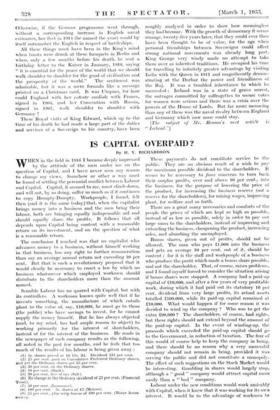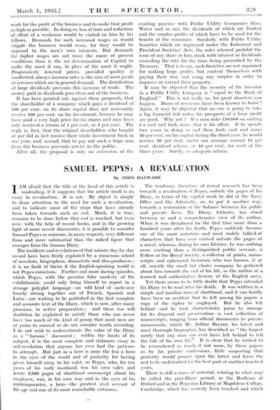IS CAPITAL OVERPAID ?
By H. Y. RICHARDSON
WHEN in the field in 1916 I became deeply impressed by the attitude of the men under me on the question of Capital, and I have never seen any reason to change my views. Somehow or other a way must be found of settling the perennial conflict between Labour and Capital. Capital, it seemed to me, must climb down, and will not, by so doing, suffer so much as if it continues to copy Humpty-Dumpty. Workpeople, I found, felt then (and it is the same today) that, when the capitalist brings money into a business and the men bring their labour, both are bringing equally indispensable aid and should equally share the profits. It follows that all depends upon Capital being content with a reasonable return on its investment, and on the question of what is a reasonable return.
The conclusion I reached was that no capitalist who advances money to a business, without himself working in that business, has any right to further, remuneration than say an average annual return not exceeding 10 per cent. But that is such a revolutionary proposal that it would clearly be necessary to enact a law by which no business whatsoever which employed, workmen should distribute to the shareholders more than the amount named. , • Sensible Labour has no quarrel with Capital, but with its controllers. A workman knows quite well that if he invents something, the manufacture of which entails plant to the value of,• say,: £10,000, he must go to those (the public) who have savings to invest, for he cannot supply the money himself.. But he has always objected (and, to my mind, has had ample ;reason to object) to working primarily for the interest of shareholders, instead of for the interest of the business.. He reads in the newspaper of such company results as the following, all noted in the past few months, and he feels that too much of the results of his labour is being given away : (1) 58. shares. priced at £6 I Is. 3d. Dividend 135 per cent.
(2) 25 per cent. paid on Cumulative Preferred Ordinary shares, and yet the Ordinary shares get 35 per cent.
(3) 30 per cent. on the Ordinary shares. (4) 18 per cent. (Bank).
(5) 30 per cont. free of tax (Salt).
(6) No change in the Ordinary dividend of 25 per cent. (Financial
Trust).
(7) 50 per cent. (Insurance).
(8) 100 per -cent: 5s. shares at £5 (Motors).
(9) 25 per cent., plus scrip bonus of 100 percent. (Motor Acces- sories).
These payments do not constitute service to the public. They are an obvious result of a wish to pay the maximum possible dividend to the shareholders. It seems to be necessary to force concerns to turn back their surplus profits, over and above 10 per cent., into the business, for the purpose of lowering. the price of the product, for increasing the business reserve (not a reserve for the shareholders), for raising wages, improving plant, for welfare and so forth.
There are a great many necessaries and comforts of the people the prices of which are kept as high as possible, instead of as low as possible, solely in order to pay out large sums to the shareholders, instead of improving and extending the business, cheapening the product, increasing sales, and absorbing the unemployed.
Bonus shares, given out of profits, should not be allowed. The man who pays £1,000 into the business and gets an average 10 per cent. out of it, shoUld be content ; for it is the staff and workpeople of ,a business who produce the profit vlid' made a bonus share possible, and not the shareholder. That, of course, raises problems, and I found myself forced to consider the situation arising if bonus shares were stopped. A company had a 'paid-up Capital of P0,000, and after a few years of very profitable work, during which it had paid out its statutory 10 per cent. dividend *Om very large profits, its actual assets totalled £100,000, while its paid-up capital remained at £10,000. What would happen if for some reason it was decided to wind up the company ? Who was to get the extra £90,000 ? The shareholders, of course, had rights, but these rights should not extend beyond the amount of the paid-up capital. In the event of winding-up, the proceeds which exceeded the paid-up capital should go to the Government, in reduction of taxation. The fear of this would of course help to keep the company in being, and there shoUld be no reason why a very successful company should *not remain in being, provided it was serving the public and did not constitute a monopoly. The effect of such suggestions on the Stock Market would be interesting. Gambling in shares would largely stop, although a " good " company would attract capital more easily than a " bad company.
Labour under the new conditions would work amicably with Capital, when it Anew that it was working for its own interest. It would be to the advantage of workmen to work for the profit of the business and to make that profit as high as possible. In doing so, loss of time and reduction of effort of a workman would be visited on him by his fellows. Demands for such increased wages as would cripple the business would cease, for they would be opposed to the men's own interests. But demands for higher wages are not more the cause of present conditions than is the set determination of Capital to make the most it can, in place of the most it ought. Progressively lowered prices, provided quality is unaffected, always increase sales in the case of most goads or services which are in general demand. The distribution of large dividends prevents this increase of trade. The money paid in dividends goes clean out of the business.
It has been pointed out, against these proposals, that the shareholder of a company which pays a dividend of 100 per cent. on its share capital does not necessarily receive 100 per cent. on his investment, because he may have paid a very high price for his shares and may have only received a return of 4 per cent. or 5 per cent. The reply is, first, that the original shareholders who bought at par did in fact receive their whole investment back in one year, and, second, that to pay out such a large sum from the business prevents service to the public.
After all, the proposal is only an extension of the existing practice with Public Utility Companies (Gas. Water and so on), the dividends of which are limited and the surplus profits of which have to be used for the benefit of the consumer. Similarly with Public Utility Societies which are registered under the Industrial and Provident Societies' Acts, the rules whereof prohibit the issue of an• share or loan stock with interest or dividends exceeding the rate for the time being prescribed by the Treasury. That is to say, such Societies arc not organized for making large profits, but content themselves with paying their way and using any surplus in order to improve or extend their property.
It may be objected that the security of the investor in a Public Utility Company is " equal to the Bank of England." This is not really so, for great disasters can happen. Dams of reservoirs have been known to burst Again, it may be objected that no one is going to take a big financial risk unless his prospects of a large profit are good. Why not ? If a man risks £10,000 on sinking f 1r coal and finds none, that is his affair. If he spends two years in doing so and then finds coal and earns 30 per cent. on his capital during the third year. he would receive 30 per cent. under our average annual 10 per cent. dividend scheme, or 10 per cent. for each of the three years. Surely, an adequate return.



























































 Previous page
Previous page